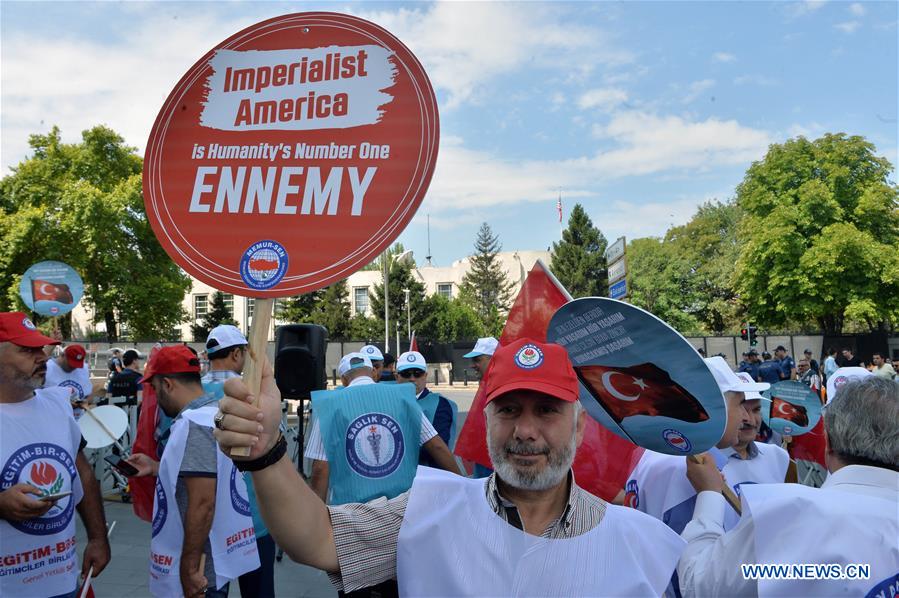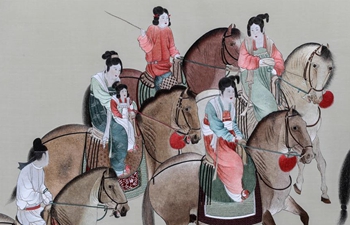
People protest near the U.S. Embassy in Ankara, Turkey, on Aug. 3, 2018, following Washington's unprecedented sanctions on two Turkish ministers over the imprisonment of U.S. Pastor Andrew Brunson in Turkey. (Xinhua/Mustafa Kaya)
by Burak Akinci, Qin Yanyang
ANKARA, Aug. 2 (Xinhua) -- The anger in a barbershop in Ankara represented the Turkish public distrust towards the U.S. following Washington's unprecedented sanctions against Turkey over Ankara's detention of a U.S. pastor.
"They (U.S.) can do whatever they want, we will stand against it. Let them hit us with the best they've got, it will change absolutely nothing," said Unver, a 60-year-old barber and owner near the U.S. embassy in Ankara, in great anger while serving a customer.
He was referring to the U.S. sanctions imposed on Wednesday on Turkish Justice Minister Abdulhamit Gul and Interior Minister Suleyman Soylu, in response to a Turkish court decision on Tuesday to reject U.S. pastor Andrew Brunson's appeal to be released from house arrest.
The U.S. decision highlights deteriorating relations between the two NATO allies. Turkish Foreign Ministry on Wednesday strongly protested the sanctions, while vowing to "retaliate."
Soon after the sanctions were announced, Turkish currency lira lost over 1.6 percent of its value against the U.S. dollar, breaking the symbolic line of 5:1 for the first time in history to hit 5.09 on Wednesday. The lira has lost around 30 percent of its value since the start of this year.
"Customers don't pay me in dollars, I don't really care if the dollar plunged event further and let me tell you that it's better to starve in dignity than die in shame," said Unver as his customer nodded as a sign of approval.
Another customer waiting in line said that he was "shocked and stunned" by the U.S. decision, while criticizing the U.S. administration for clearly forgetting "what diplomacy means."
"This decision will only exacerbate the anti-U.S. sentiment in Turkey which is strong actually, and unite the Turks," pointed out Ahmet Selvi, a retired civil servant.
"In the face of a common threat, Turks always come together whatever their political beliefs are," Selvi said.
In Turkish parliament, two opposition parties have immediately joined the ruling Justice and Development party (AKP) and its nationalist partner to condemn U.S. sanction in a rare political unity.
They have declared solidarity against what they see as "an attack on the (Turkish) republic's existence."
Brunson has lived in Turkey for more than 20 years, running a small Presbyterian congregation in the western city of Izmir.
He has been under arrest for more than two years over accusations of spying and supporting the outlawed Kurdish rebels and a movement led by U.S.-exiled cleric Fethullah Gulen, blamed by Ankara for plotting the failed coup in July 2016.
Brunson has been recently transferred from prison to house arrest, but he still faces up to 35 years in prison as his trial is ongoing in Izmir court.
Turkish President Recep Tayyip Erdogan said that his country would release the pastor once the U.S. agrees to extradite Gulen, whom the U.S. has so far refused to extradite to Turkey as Ankara has requested.
"It's simple, they can hand us the guy (Gulen) over there and the American can leave Turkey," suggested Recai Korkmaz, a shop owner along the busy Tunali Hilmi Avenue in downtown Ankara.
The man, in his 30s, and other employees of the shop angrily expressed their discontent about the U.S. decision, which they saw as "bullying coming from a country which is supposed be our ally."
"They think apparently that Turkey is a third world country or Afghanistan. If this American is innocent he will be ultimately released, but if he's not he should definitely be punished," Korkmaz said.
"It's very degrading to have a foreign country dictate its wishes on another country. We won't take it," he added.
But he also underlined that the decline of Turkish currency lira will inevitably have an impact on Turkey's economy, since the country already has a widening current account deficit and a record inflation.
Last week, U.S. President Donald Trump threatened to impose "large sanctions" if the U.S. pastor was not released.
The Turkish pro-government media interpreted the U.S. outburst as a move aimed at appeasing evangelical voters ahead of midterm elections later this year.
The Brunson case is the latest of a series of disputes that have stirred up tensions between Ankara and Washington over the last few years.
On one hand, the Turkish government feels that the U.S. does not take seriously its security concerns, as Ankara is unsatisfied with U.S. support for Syrian Kurdish militia, namely People's Protection Units (YPG), which fights with the U.S. against IS in Syria.
Given the group's links to the outlawed Kurdistan Workers' Party (PKK), Ankara's primary goal in Syria has been to prevent the YPG from creating an autonomous Kurdish region along the Turkish border, which it fears could lead to an independence bid or be used to stage attacks on Turkey.
As the U.S. has taken a seemingly hands-off approach in Syria and the region, Turkey has repaired its strained relations with Russia, which has stepped up to fill the power vacuum Washington left behind.
In late December, Turkey signed an agreement with Russia on the purchase of S-400 missiles, reportedly worth 2.5 billion U.S. dollars, as part of Ankara's plans to boost its defense capabilities.
The system is incompatible with the NATO systems, so the purchase has unnerved NATO member countries, which are already wary of Moscow's military presence in the Middle East.















